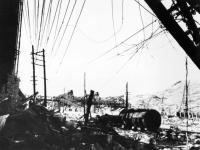BROOKE GLADSTONE: Last week, many news outlets marked the anniversary of August 6th, 1945, when the U.S. Air Force dropped the bomb called Little Boy on the city of Hiroshima, followed days later by the detonation of Fat Man over Nagasaki. Thousands died immediately.
PRESIDENT HARRY TRUMAN: The atomic bombs which fell on Hiroshima and Nagasaki must be made a signal, not for the old process of falling apart but for a new era, an era of ever-closer unity and ever-closer friendship among peaceful nations.
BROOKE GLADSTONE: President Truman spoke at the Navy Day celebration in New York City in October, 1945. By then, thousands more Japanese were dying of a mysterious disease, though few Americans would learn about it because journalists were barred from the affected area. Chicago Daily News war correspondent George Weller was one of the first to slip into Nagasaki, and he wrote a series of articles. But he made the mistake of filing them through General Douglas MacArthur’s Tokyo headquarters, where they were summarily spiked, unpublished until Weller’s son found old carbon copies in his home 60 years later. The first sentence of one of Weller’s first articles makes you wonder why MacArthur suppressed them. It read, quote: “The atomic bomb may be classified as a weapon capable of being used indiscriminately, but its use in Nagasaki was selective and proper and as merciful as such a gigantic force could be expected to be.” Greg Mitchell has written a lot about the incident, and he told us a few years ago that Weller’s first take on the story, which was to change radically, wasn't surprising, given the context.
GREG MITCHELL:
Well, of course, you have to remember this was at the end of World War II and Weller and other correspondents had seen a great deal of death in the preceding years. And the atomic bomb seemed to be just a bigger blast, just a bigger bomb, because not much was known about radiation. And, in fact, that's why MacArthur did not want people to go to these cities. That's why U.S. officials, starting then and going on for years and decades, did not want people to focus on the properties of the bomb that made it different.
BROOKE GLADSTONE: Because they knew and no one else did.
GREG MITCHELL: That's right. So Weller's initial reaction changed when he actually went into the hospitals. And literally, the same day he wrote that later in that day he wrote a quite different account after seeing the patients in the hospitals dying a month after the blast.
BROOKE GLADSTONE: Can you describe what he wrote about when he went to those hospitals and saw the impact of the bomb?
GREG MITCHELL: Well, he saw women and children and other civilians who were lying on the floor or lying on beds with their, their hair falling out, with strange red spots all over them, in terrible shape. He called this Disease X because the doctors didn't quite know what it was. There were rumors about radiation. The little that people knew about radiation disease, this seemed to be it. And so, he wrote about these people, and his second and third accounts that came out of Nagasaki were quite different.
BROOKE GLADSTONE: And that last piece he wrote ends with a statement that Americans are due to arrive in Nagasaki to study the bombsite, and he then writes, quote: "Japanese hope that they will bring a solution for Disease X." Do you think if Weller hadn't discussed Disease X in that piece that maybe it wouldn't have been censored?
GREG MITCHELL: It's hard to say because there was a clamp down on virtually everything going on surrounding these two cities. A day or two after he got there, the uh military brought in a small group of other war correspondents for a short tour, and their stories were then held up and were censored. And the accounts that they gave focused on the blast and focused on what had happened in the cities, with no mention of dying people in the hospital.
BROOKE GLADSTONE: Greg, you co-wrote a book titled, Hiroshima in America, Fifty Years of Denial. What was most remarkable for you when you read these accounts for the first time?
GREG MITCHELL: Well, I think it was how Weller himself symbolized or represented the whole American and world experience with the bomb. There was his initial elation, in a way, seeing the effects of the bomb and how it may have produced the end of the war. And it was – it was almost triumphal. But then when he learned, and then later the world learned, of the very special properties of this bomb and the fact that its poisons could be spread for many miles, and even threaten the end of the world, eventually, he had a very different outlook. He never became a real anti-nuker but his whole experience, just in a little nutshell there in a few days, really captured a lot of what the American experience was in responding to the bomb.
BROOKE GLADSTONE: Greg, thank you very much.
GREG MITCHELL: Thank you.
BROOKE GLADSTONE: We spoke to Greg Mitchell, then editor of Editor and Publisher, in 2005.
